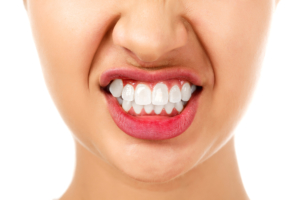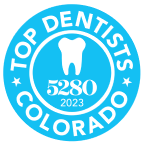 Bruxism, or teeth grinding, is often characterized by jaw stiffness or soreness, dental sensitivity, and tension headaches. Sound familiar? Because teeth grinding occurs mostly at night, most people don’t realize they suffer from it. Visit an experienced dentist today if you are experiencing any of those symptoms.
Bruxism, or teeth grinding, is often characterized by jaw stiffness or soreness, dental sensitivity, and tension headaches. Sound familiar? Because teeth grinding occurs mostly at night, most people don’t realize they suffer from it. Visit an experienced dentist today if you are experiencing any of those symptoms.
Other side effects of teeth grinding include:
- Facial muscle fatigue
- Interrupted sleep
- Facial swelling
- Loose teeth
- Tooth pain
- Damaged fillings
- Gum tenderness
- Gum recession
- Popping or clicking of the jaw
- Neck stiffness
When you visit a dentist, he or she will ask about your symptoms and conduct a thorough exam of your teeth, gums, and jawbone. This enables the dentist to provide an accurate diagnosis and treatment options.
Continue reading to learn about the most effective lifestyle adjustments and treatments for teeth grinding.
Lifestyle Adjustments to Prevent Teeth Grinding
Stress and anxiety are two of the most common causes of bruxism. If a dentist determines this is the cause for you, he may recommend making some of these lifestyle adjustments:
Reduce Caffeine Consumption
If you’re drinking caffeine all throughout the day, one of the best things you can do is significantly decrease that amount. Caffeine contributes to bruxism because it triggers muscle activity.
Try to limit yourself to one cup of coffee, tea, or soda per day; and only drink it in the morning or early afternoon. This is especially important for those with anxiety because caffeine only magnifies anxious feelings and stress.
Eat Properly
Diets that are high in sugar or carbohydrates can significantly affect a person’s ability to sleep. Again, try to avoid these in the late afternoon or evening. Instead, try some of these foods to enhance your sleep quality:
- Cottage cheese
- Almonds
- Kiwifruit
- Yogurt
- Turkey
- Eggs
- Fish
Exercise Regularly
When you exercise, endorphins are released into your bloodstream. These are known as the “happy hormones” because they help minimize discomfort and create feelings of euphoria.
A daily exercise routine will contribute to a better night’s sleep and lower levels of anxiety and stress.
Other Recommendations
In addition to these suggestions, your dentist may also recommend getting a full seven or eight hours of sleep per night, avoiding chewing gum, doing yoga, or taking anti-anxiety medications or supplements.
Implementing one or more of these lifestyle adjustments can significantly decrease teeth grinding.
Treatments for Teeth Grinding
Other causes of bruxism include a misaligned bite and obstructive sleep apnea. In these cases, and when the above methods don’t work, your dentist may recommend a mouthguard, oral appliance, or orthodontic treatment.
Mouth Guard
Dental mouth guards are custom-made for each patient. The mouth guard becomes a barrier between the upper and lower teeth to prevent cracking and breaking caused by teeth grinding.
Oral Appliance
Patients who suffer from obstructive sleep apnea can greatly benefit from an oral appliance that opens the airway while sleeping. This treatment requires the help of a certified sleep physician.
Orthodontics
Invisalign® and/or traditional braces can reduce teeth grinding in patients with an improper bite. Consequently, teeth grinding can also cause teeth to become misaligned.
Contact Our Dental Team Today
If you or a loved one is suffering from any of the side effects that come with teeth grinding, schedule an appointment with a qualified and experienced dentist today.
Our team of experts at Metropolitan Dental Care are trained and prepared to treat bruxism. Contact us today at (303) 534-2626 to schedule an initial consultation.

